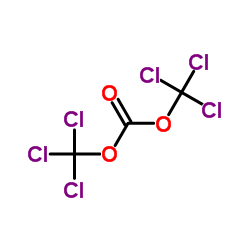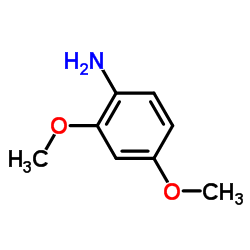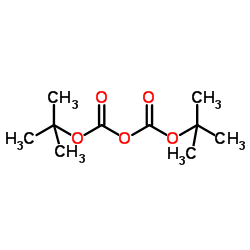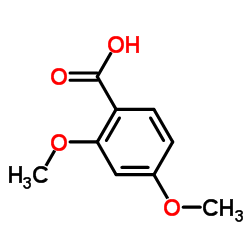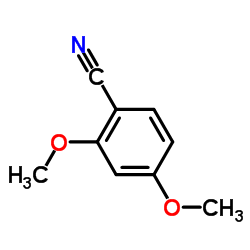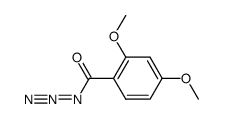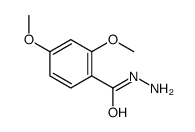84370-87-6
| 中文名 | 2,4-二甲氧基苯异氰酸酯 |
|---|---|
| 英文名 | 2,4-Dimethoxyphenyl isocyanate |
| 中文别名 | 异氰酸2,4-二甲氧基苯酯 |
| 英文别名 |
EINECS 282-747-4
1-isocyanato-2,4-dimethoxybenzene MFCD00002005 |
| 密度 | 1.1g/cm3 |
|---|---|
| 沸点 | 139-141°C 11mm |
| 熔点 | 31-32°C |
| 分子式 | C9H9NO3 |
| 分子量 | 179.17300 |
| 闪点 | >110°C |
| 精确质量 | 179.05800 |
| PSA | 47.89000 |
| LogP | 1.67110 |
| 外观性状 | 透明淡黄色液体在熔点后 |
| 折射率 | 1.5465-1.5485 |
| 储存条件 | 干燥、阴凉、密闭处、惰性气体的环境中 |
| 稳定性 | 按规定使用和贮存的不会分解,避氧化物、热、酒精、胺、潮湿 |
| 计算化学 | 1.疏水参数计算参考值(XlogP):2.7 2.氢键供体数量:0 3.氢键受体数量:4 4.可旋转化学键数量:3 5.互变异构体数量:无 6.拓扑分子极性表面积47.9 7.重原子数量:13 8.表面电荷:0 9.复杂度:201 10.同位素原子数量:0 11.确定原子立构中心数量:0 12.不确定原子立构中心数量:0 13.确定化学键立构中心数量:0 14.不确定化学键立构中心数量:0 15.共价键单元数量:1 |
| 更多 | 1. 性状:刺激性的白色固体 2. 密度(g/mL25 ºC):未确定 3. 相对蒸汽密度(g/mL,空气=1):未确定 4. 熔点(ºC):31-32 5. 沸点(ºC,常压):未确定 6. 沸点(ºC11mmHg):139-141 7. 折射率:1.5465-1.5485 8. 闪点(ºC):未确定 9. 比旋光度(º):未确定 10. 自燃点或引燃温度(ºC):>110 11. 蒸气压(kPa,):未确定 12. 饱和蒸气压(kPa,60ºC):未确定 13. 燃烧热(KJ/mol):未确定 14. 临界温度(ºC):未确定 15. 临界压力(KPa):未确定 16. 油水(正辛醇/水)分配系数的对数值:未确定 17. 爆炸上限(%,V/V):未确定 18. 爆炸下限(%,V/V):未确定 19. 溶解性:能溶解于水 |
Synonym:None Section 2 - COMPOSITION, INFORMATION ON INGREDIENTS
Risk Phrases: 36/37/38 42 Section 3 - HAZARDS IDENTIFICATION EMERGENCY OVERVIEW
Irritating to eyes, respiratory system and skin. May cause sensitization by inhalation.The toxicological properties of this material have not been fully investigated.Lachrymator (substance which increases the flow of tears). Potential Health Effects Eye: Causes eye irritation. Lachrymator (substance which increases the flow of tears). Skin: Causes skin irritation. The toxicological properties of this material have not been fully investigated. Ingestion: Causes gastrointestinal irritation with nausea, vomiting and diarrhea. The toxicological properties of this substance have not been fully investigated. Inhalation: May cause irritation of the respiratory tract with burning pain in the nose and throat, coughing, wheezing, shortness of breath and pulmonary edema. The toxicological properties of this substance have not been fully investigated. Chronic: Repeated exposure may cause allergic respiratory reaction (asthma). Section 4 - FIRST AID MEASURES Eyes: Flush eyes with plenty of water for at least 15 minutes, occasionally lifting the upper and lower eyelids. Get medical aid. Skin: Get medical aid. Flush skin with plenty of water for at least 15 minutes while removing contaminated clothing and shoes. Wash clothing before reuse. Ingestion: Never give anything by mouth to an unconscious person. Get medical aid. Do NOT induce vomiting. If conscious and alert, rinse mouth and drink 2-4 cupfuls of milk or water. Wash mouth out with water. Inhalation: Remove from exposure and move to fresh air immediately. If not breathing, give artificial respiration. If breathing is difficult, give oxygen. Get medical aid. Do NOT use mouth-to-mouth resuscitation. Notes to Physician: Treat symptomatically and supportively. Section 5 - FIRE FIGHTING MEASURES General Information: As in any fire, wear a self-contained breathing apparatus in pressure-demand, MSHA/NIOSH (approved or equivalent), and full protective gear. During a fire, irritating and highly toxic gases may be generated by thermal decomposition or combustion. Vapors may be heavier than air. They can spread along the ground and collect in low or confined areas. Extinguishing Media: Use agent most appropriate to extinguish fire. Use water spray, dry chemical, carbon dioxide, or appropriate foam. Section 6 - ACCIDENTAL RELEASE MEASURES General Information: Use proper personal protective equipment as indicated in Section 8. Spills/Leaks: Vacuum or sweep up material and place into a suitable disposal container. Clean up spills immediately, observing precautions in the Protective Equipment section. Avoid generating dusty conditions. Provide ventilation. Section 7 - HANDLING and STORAGE Handling: Wash thoroughly after handling. Use with adequate ventilation. Avoid contact with eyes, skin, and clothing. Keep container tightly closed. Avoid ingestion and inhalation. Wash clothing before reuse. Storage: Store in a tightly closed container. Store in a cool, dry, well-ventilated area away from incompatible substances. Section 8 - EXPOSURE CONTROLS, PERSONAL PROTECTION Engineering Controls: Facilities storing or utilizing this material should be equipped with an eyewash facility and a safety shower. Use adequate ventilation to keep airborne concentrations low. Exposure Limits CAS# 84370-87-6: Personal Protective Equipment Eyes: Wear appropriate protective eyeglasses or chemical safety goggles as described by OSHA's eye and face protection regulations in 29 CFR 1910.133 or European Standard EN166. Skin: Wear appropriate protective gloves to prevent skin exposure. Clothing: Wear appropriate protective clothing to prevent skin exposure. Respirators: Follow the OSHA respirator regulations found in 29 CFR 1910.134 or European Standard EN 149. Use a NIOSH/MSHA or European Standard EN 149 approved respirator if exposure limits are exceeded or if irritation or other symptoms are experienced. Section 9 - PHYSICAL AND CHEMICAL PROPERTIES Physical State: Solid Color: tan Odor: Not available. pH: Not available. Vapor Pressure: Not available. Viscosity: Not available. Boiling Point: 140 deg C @ 11.00mmHg Freezing/Melting Point: 30 deg C Autoignition Temperature: Not available. Flash Point: > 110 deg C (> 230.00 deg F) Explosion Limits, lower: N/A Explosion Limits, upper: N/A Decomposition Temperature: Solubility in water: Specific Gravity/Density: Molecular Formula: (CH3O)2C6H3NCO Molecular Weight: 179.18 Section 10 - STABILITY AND REACTIVITY Chemical Stability: Stable at room temperature in closed containers under normal storage and handling conditions. Conditions to Avoid: Incompatible materials, dust generation, excess heat. Incompatibilities with Other Materials: Oxidizing agents. Hazardous Decomposition Products: Hydrogen cyanide, nitrogen oxides, carbon monoxide, irritating and toxic fumes and gases, carbon dioxide. Hazardous Polymerization: Will not occur. Section 11 - TOXICOLOGICAL INFORMATION RTECS#: CAS# 84370-87-6 unlisted. LD50/LC50: Not available. Carcinogenicity: 2,4-Dimethoxyphenyl Isocyanate - Not listed by ACGIH, IARC, or NTP. Section 12 - ECOLOGICAL INFORMATION Section 13 - DISPOSAL CONSIDERATIONS Dispose of in a manner consistent with federal, state, and local regulations. Section 14 - TRANSPORT INFORMATION IATA Shipping Name: ISOCYANATES, TOXIC, N.O.S.* Hazard Class: 6.1 UN Number: 2206 Packing Group: III IMO Shipping Name: ISOCYANATES, TOXIC, N.O.S. Hazard Class: 6.1 UN Number: 2206 Packing Group: III RID/ADR Shipping Name: ISOCYANATES, TOXIC, N.O.S. Hazard Class: 6.1 UN Number: 2206 Packing group: III Section 15 - REGULATORY INFORMATION European/International Regulations European Labeling in Accordance with EC Directives Hazard Symbols: XN Risk Phrases: R 36/37/38 Irritating to eyes, respiratory system and skin. R 42 May cause sensitization by inhalation. Safety Phrases: S 26 In case of contact with eyes, rinse immediately with plenty of water and seek medical advice. S 28A After contact with skin, wash immediately with plenty of water. S 36/37/39 Wear suitable protective clothing, gloves and eye/face protection. S 37 Wear suitable gloves. S 45 In case of accident or if you feel unwell, seek medical advice immediately (show the label where possible). WGK (Water Danger/Protection) CAS# 84370-87-6: No information available. Canada None of the chemicals in this product are listed on the DSL/NDSL list. CAS# 84370-87-6 is not listed on Canada's Ingredient Disclosure List. US FEDERAL TSCA CAS# 84370-87-6 is not listed on the TSCA inventory. It is for research and development use only. SECTION 16 - ADDITIONAL INFORMATION N/A |
|
生态学数据: 对水是稍微危害的,若无政府许可,勿将材料排入周围环境
|
| 符号 |


GHS07, GHS08 |
|---|---|
| 信号词 | Danger |
| 危害声明 | H302 + H312 + H332-H315-H319-H334-H335 |
| 警示性声明 | P261-P280-P305 + P351 + P338-P342 + P311 |
| 个人防护装备 | dust mask type N95 (US);Eyeshields;Faceshields;Gloves |
| 危害码 (欧洲) | Xn: Harmful; |
| 风险声明 (欧洲) | R36/37/38 |
| 安全声明 (欧洲) | S36/37/39-S26 |
| 危险品运输编码 | 2811 |
| 包装等级 | II |
| 危险类别 | 6.1 |
| 海关编码 | 2929109000 |
|
~% 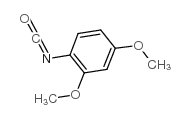
84370-87-6 |
| 文献:Chinese Chemical Letters, , vol. 25, # 3 p. 451 - 454 |
|
~77% 
84370-87-6 |
| 文献:Knoelker, Hans-Joachim; Braxmeier, Tobias; Schlechtingen, Georg Angewandte Chemie, 1995 , vol. 107, # 22 p. 2746 - 2749 |
|
~% 
84370-87-6 |
| 文献:Tetrahedron Letters, , vol. 40, # 38 p. 6891 - 6894 |
|
~% 
84370-87-6 |
| 文献:Journal of Medicinal Chemistry, , vol. 33, # 7 p. 1932 - 1935 |
|
~11% 
84370-87-6 |
| 文献:Chemistry Letters, , p. 43 - 46 |
|
~% 
84370-87-6 |
| 文献:Tetrahedron Letters, , vol. 40, # 38 p. 6891 - 6894 |
|
~% 
84370-87-6 |
| 文献:J. Med. Chem., , vol. 7, p. 97 - 101 |
| 海关编码 | 2929109000 |
|---|---|
| 中文概述 | 2929109000. 其他异氰酸酯. 增值税率:17.0%. 退税率:13.0%. 监管条件:无. 最惠国关税:6.5%. 普通关税:30.0% |
| 申报要素 | 品名, 成分含量, 用途 |
| Summary | 2929109000. other isocyanates. VAT:17.0%. Tax rebate rate:13.0%. . MFN tariff:6.5%. General tariff:30.0% |


